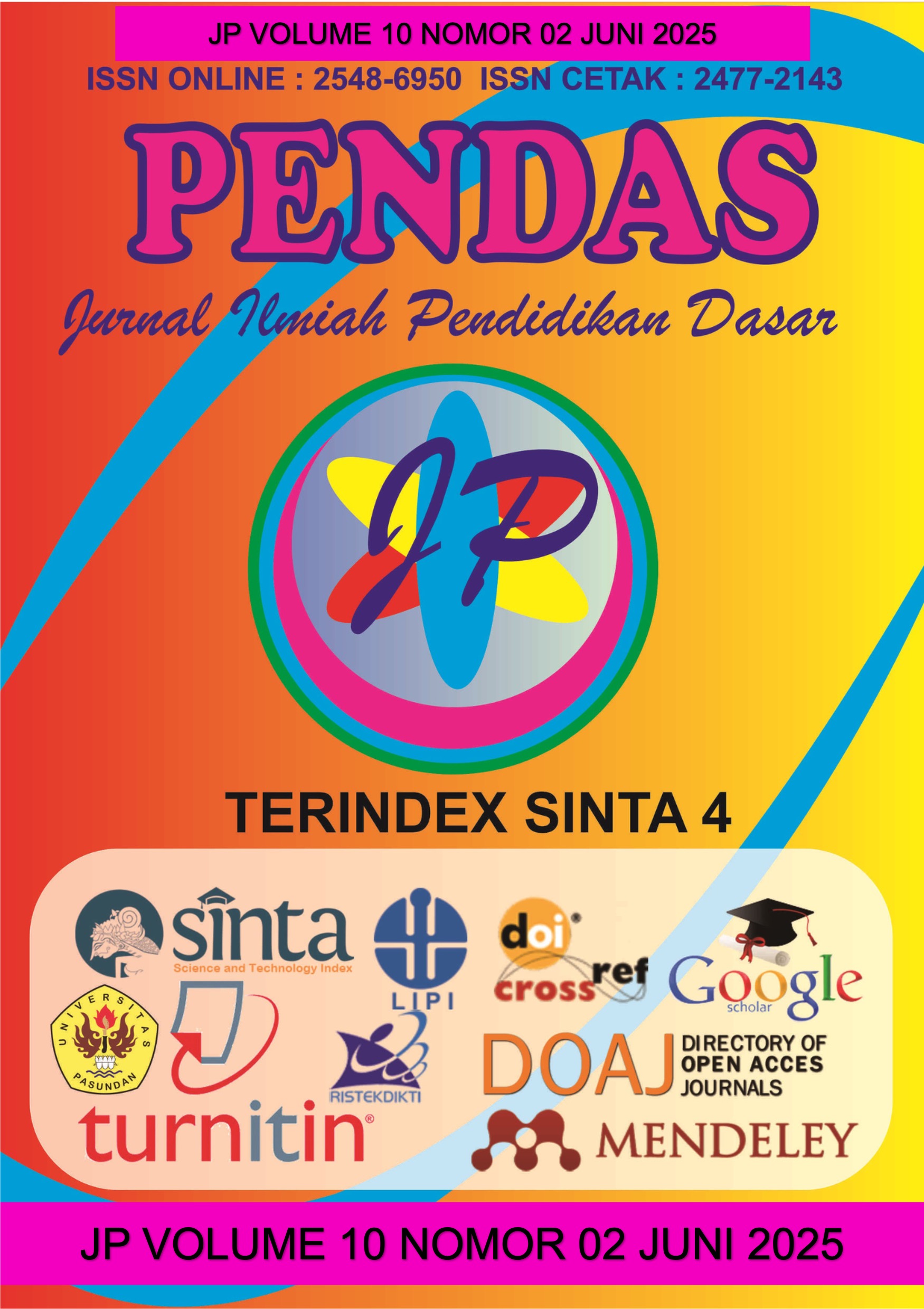PERSEPSI SISWA TERHADAP PENGGUNAAN CHAT GPT SEBAGAI BELAJAR DI ERA DIGITAL
DOI:
https://doi.org/10.23969/jp.v10i02.25043Keywords:
: ChatGPT, Critical thinking skills, artificial intelligence, digital learning, qualitative interviewsAbstract
The development of artificial intelligence (AI), particularly ChatGPT, has brought
significant changes to the world of education. This research aims to analyze the
influence of ChatGPT usage on the critical thinking skills of vocational high school
students, identify patterns of ChatGPT utilization in the learning process, and
explore the challenges faced in its use. The research employs a qualitative
approach with in-depth interview methods involving 5 students who actively use
ChatGPT in their learning activities. Data was collected through interviews and
analysis of students' conversations with ChatGPT to obtain a comprehensive
picture of their experiences. The results show that students utilize ChatGPT
primarily to obtain references, overcome creative blocks, and expedite task
completion. Although ChatGPT helps in terms of efficiency, there are concerns
about dependency that may hinder the development of independent analysis and
evaluation abilities. This research concludes that the influence of ChatGPT on
critical thinking skills has a dualistic nature - on one hand, it can enhance analytical
abilities through personalized learning, but on the other hand, it has the potential
to reduce students' cognitive efforts if used without clear limitations.
Downloads
References
Acep Hendra, & Supeno, H. (2024). Teknik Pengembangan Rencana Tugas Kelas berbasis Kecerdasan Generatif sebagai Solusi Untuk Menangani Kecurangan dengan Bantuan AI. TEMATIK, 11(1), 78–84. https://doi.org/10.38204/tematik.v11i1.1841
Akbar, A. (2019). Tantangan dan solusi dalam perkembangan teknologi pendidikan di Indonesia. Prosiding Seminar Nasional Program Pascasarjana Universitas PGRI Palembang., 18–25.
Evy Nur Rohmawaty, Danial Hilmi, M Sholih Salimul Uqba, & Ummu Sulaimah Saleh. (2024). Peran Artificial Intelligence (AI) dalam Pembelajaran Bahasa Arab Mahasiswa Pascasarjana UIN Maulana Malik Ibrahim Malang. Khatulistiwa: Jurnal Pendidikan dan Sosial Humaniora, 4(3), 316–328. https://doi.org/10.55606/khatulistiwa.v4i3.4023
Febrianty, C., Sari, M. T. P., & Syarafi, R. H. (2025). Analisis Dampak chatGPT terhadap proses pembelajaran mahasiswa : systematic literatur Review. 9(1).
Nando Haviki, Siswanto, Novalia, Nuriska Jumaini, & Nurlaili Purnamasari. (2024). Presepsi mahasiswa terhadap penggunaan ChatGPT dalam menunjang pembelajaran di IAIN Curup. Jurnal Pendidikan Guru, 5(2).
Pratama, R. M. D., & Hastuti, D. P. (2024). The use of artificial intelligence to improve EFL students’ writing skill. English Learning Innovation, 5(1), 13–25. https://doi.org/10.22219/englie.v5i1.30212
Priowirjanto, E. S., Israwan, A. R. R., Josca, M. P., Abdallah, R., Kevin, N., Ardhiansyah, C., Desiani, R. H., & Munaf, C. R. (t.t.). Sosialisasi Mengenai Aspek Hukum dari Penggunaan ChatGPT dalam Dunia Pendidikan di SMK Al-Wafa Kabupaten Bandung.
Putra, R. A. (2018). Peran Teknologi Digital dalam Perkembangan Dunia .4.
Putri, M. S., & Widyaningrum, A. G. (2022). Persepsi Siswa dalam Pemanfaatan Kecerdasan Buatan pada Pembelajaran di SMAN 7 Bekasi. Public Sphere: Jurnal Sosial Politik, Pemerintahan dan Hukum, 1(2). https://doi.org/10.59818/jps.v3i3.992
Raman, R., Nair, V., Dinesh, S., & Acharyulu, R. (2024). Comparative Analysis of ChatGPT and Bard in Digital Governance: Accuracy, Adaptability, and Readability Insights. Digital Government: Research and Practice, 3674846. https://doi.org/10.1145/3674846
Riska Rahman Tanjung, Annida Azhari Ritonga, Bintang Mahrani Abdullah, Nita Afriani Siregar, & Armilah Armilah. (2024). Transformasi Digital dalam Pendidikan: Meningkatkan Kualitas Pembelajaran Melalui Teknologi. Sinar Dunia: Jurnal Riset Sosial Humaniora dan Ilmu Pendidikan, 3(2), 211–217. https://doi.org/10.58192/sidu.v3i2.2195
Safitri, I., Wulandari, O., Ardhana, I. A., Masithoh, A. D., & Aprilianto, A. (2024). From Tradition to Tech the Cultural Evolution of Student Learning in the Era of Artificial Intelligence Shophistication.
Sholihatin, E., Saka, A. D. P., Andhika, D. R., Ardana, A. P. S., Yusaga, C. I., Fajar, R. I., & Virgano, B. A. (2023). Pemanfaatan Teknologi Chat GPT dalam Pembelajaran Bahasa Indonesia di Era Digital pada Mahasiswa Universitas Pembangunan Nasional Veteran Jawa Timur.
Siti Fauziah, Firman, & Dina Sukma. (2025). Aktualisasi Penggunaan ChatGPT dalam Penguasaan Materi Pembelajaran di Sekolah. Journal Islamic Pedagogia, 5(1), 14–21. https://doi.org/10.31943/pedagogia.v5i1.133
Sugiarto, S., & Suhono, S. (2023). Studi Kasus Penggunaan ChatGPT pada Mahasiswa di PTKI Lampung. Jurnal Al-Qiyam, 4(2), 110–119. https://doi.org/10.33648/alqiyam.v4i2.318
Suharmawan, W. (2023). Pemanfaatan Chat GPT Dalam Dunia Pendidikan. Education Journal : Journal Educational Research and Development, 7(2), 158–166. https://doi.org/10.31537/ej.v7i2.1248
Supriyono, A., Lesmono, A. D., & Prihandono, T. (2024). The Impact and Challenges of Utilizing ChatGPT in Learning within the Kurikulum: A Systematic Literature Review. Jurnal Pendidikan dan Kebudayaan, 9.
Susmita, N., Zaim, M., Thahar, H. E., & Wahyuni, S. (2024). Pemanfaatan Media Kecerdasan Buatan dalam Pembelajaran Bahasa Indonesia Tingkat sekolah Menengah atas: Perspektif Siswa. Visipena, 15(1), 80–95. https://doi.org/10.46244/visipena.v15i1.2688
Downloads
Published
Issue
Section
License
Copyright (c) 2025 Pendas : Jurnal Ilmiah Pendidikan Dasar

This work is licensed under a Creative Commons Attribution 4.0 International License.














































